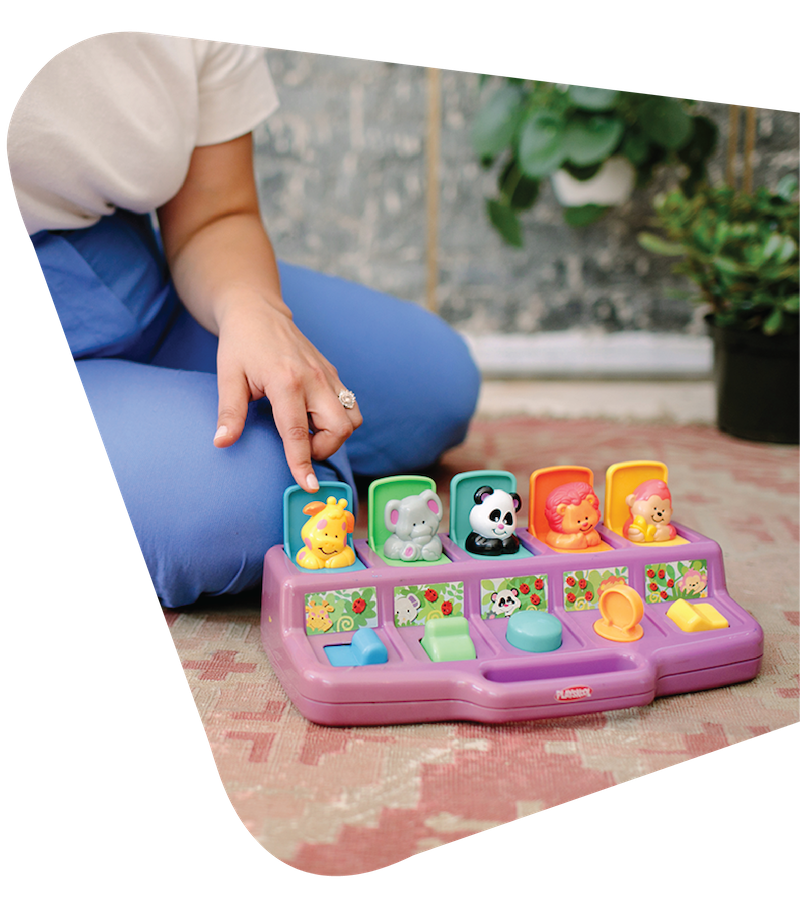
Speech and Language Therapy
When children receive speech and language therapy, they learn the tools they need to share their message with the world.
Unfortunately, only 60% of young children with communication disorders receive the help they need. This can lead to difficulties in the school-age years with speaking in a classroom, making friends, reading, and writing.
If speech therapy is provided from an early age, kids can make the connections they need to be successful throughout their lives.
The first step in a successful speech therapy journey is the relationship that you and your family have with your therapist. Using a comprehensive evaluation process, I work with parents, caregivers, and educators to find the plan that is right for your child.
Articulation Therapy
Speech (Articulation) is the ability to say sounds clearly.
- Do you find that you are the only person who understands your child?
- Do strangers constantly need to ask your child to repeat something?
- Is your child having trouble articulating a particular sound?
Apraxia Treatment
Apraxia is a motor planning disorder that impacts the way a child put sounds together.
- Does your child have very few speech sounds?
- Is it difficult for your child to say longer words?
- So you find that even you have difficulty understanding what your child is trying to communicate?
Auditory Processing Therapy
Auditory Processing is what we do with the information we hear.
- Does your child have typical hearing but can’t remember what you said?
- Do you notice that your child confuses pronunciation of words or reverses word orders?
- Is it hard for your child to listen in noisy settings?
Language Therapy
Language is the ability to understand language and put words together.
- Is it difficult for your child to follow directions?
- Is your toddler learning new words every day?
- Can your preschooler put words together to make sentences?
- Can your school-age child understand what he is reading?
Reading Comprehension Therapy
Reading Comprehension is the ability to understand what we are reading.
- Is your child able to read the words but has difficulty making sense of what is happening in the story?
- Is it hard for your child to retell a simple story?
Social Skills Groups
Social Skills are those essential skills that children need to participate in conversations and make friends.
- Can your child participate in pretend play?
- Does your child have good eye contact?
- Can your child turn take and play games with other children?
Other Therapy Services
Executive Functioning Coaching
Executive Functioning is a child’s ability to organize information and plan for assignments. As children progress through the grades and assignments become more complex, these skills can suffer.
- Is your child’s backpack a mess?
- Can your child keep track of important assignments and tests?
- Can your child organize and write a multi-paragraph essay?
Feeding Therapy
Picky Eaters are children who do not have any medical issues that would prevent them from eating a variety of foods and textures.
- Does your child avoid things that are hard to chew?
- Does your child eat less than 5 different foods?
- Is it difficult to go to social gatherings because of your child’s eating habits?
Problem Feeders are children who struggle to eat from the beginning.
- Did your baby have difficulty latching?
- Is there a medical diagnosis that is preventing your child from eating?
Oromyofunctional Therapy (Pediatrics and Adults)
Orofacial Myofunctional Disorders can affect muscles and functions of the face and mouth. It can affect speech, breathing, swallowing, and facial growth and development.
**OMDs can affect children and adults. This is the only service I currently offer to pediatric and adult patients
- Does your child have difficulty latching at the breast?
- Does your child have an open-mouth at rest?
- Do you notice that your child drools?
- Do you or your child snore?
- Do you or your child have a tongue or a lip tie?
Thumb Sucking Cessation Treatment
Thumb sucking is a soothing behavior that many children use.
To successfully eliminate thumb sucking, you need a plan to modify the behavior and retrain the oral muscles.
Parent Education
I also offer parent / professional education in my group coaching.

I have specialized therapy training in:
Apraxia
PROMPT, DTTC
nationally recognized programs to assist with apraxia of speech and motor planning deficits
Reading
Visualizing + Verbalizing, Read Write, Inc.
step-by-step protocol for organizing letters, sounds and ideas for reading, writing and speaking
Writing
Writing Revolution
evidence based structured approach for teaching sentence writing and paragraph creation
Frequently Asked Questions
When should I contact a speech therapist?
You can contact me for a free 15 minute phone consultation at any time. I know it is stressful to worry about your child, so together we can figure out what next steps are.
Where do you offer sessions?
Currently, I am providing all sessions via telehealth due to the COVID-19 pandemic. Typically, all sessions are home-based, meaning, I come to your home to provide all services.
Do you accept insurance?
I do not accept insurance for speech and language therapy. However, I will provide you with invoices at the end of each month that can be submitted to your insurance company for out-of-network reimbursement.
How long are sessions? How often?
At our initial consultation, we will discuss your child’s individual treatment plan. Usually, sessions for young children are 30 minutes 1-2x per week, while sessions for older children are 45 minutes 1-2x per week. All oral myofunctional therapy visits are 30 Minutes.
